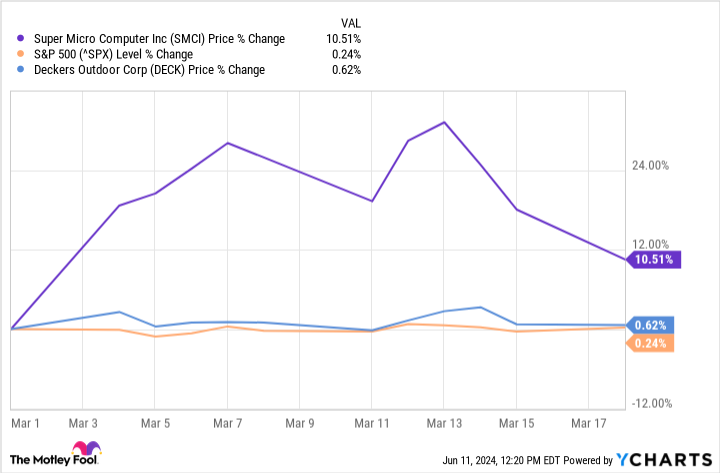On June 7, S&P Dow Jones Indices announced that cybersecurity company CrowdStrike Holdings (NASDAQ: CRWD) will be entering its famous S&P 500 index on June 24. It’s an announcement that’s captured the attention of many investors.
With a market capitalization of $94 billion as of this writing, CrowdStrike will be one of the most valuable companies ever added to the S&P 500. In recent years, Airbnb and Uber Technologies have been other major additions with valuations of around $80 billion and $125 billion, respectively. While CrowdStrike goes toe-to-toe with these industry leaders, by far the largest addition was Tesla in 2020, which boasted a market cap of about $400 billion when news broke of its addition to the S&P 500.
So what can CrowdStrike investors expect now? Here are some takeaways we can glean by using history as a guide.
The S&P 500 inclusion effect
There’s an investing theory called the S&P 500 inclusion effect. The theory states that between the announcement and the day it officially joins the index, stocks tend to outperform the market average. As an example, Super Micro Computer was added to the S&P 500 earlier this year, and it indeed outperformed between the announcement and its official inclusion.
However, this doesn’t always happen, and any gains aren’t usually as big as they were for Super Micro Computer. For example, Deckers Outdoor was announced and added at the exact same time as Super Micro Computer. But it didn’t enjoy the same rally as you can see below:

In other words, stocks aren’t guaranteed to get a major boost when they’re in line to join the S&P 500 — Super Micro Computer jumped whereas Deckers barely moved.
CrowdStrike stock could decline in the next month or so based on a 2021 study from S&P Global that analyzed over 25 years of data. According to the study, between the announcement and official inclusion in the S&P 500, the median stock outperformance was about 3.5 percentage points. In other words, if the S&P 500 went up 1% during the interim period, the stock joining the index went up about 4.5%.
As of this writing, CrowdStrike stock is up 11.0% since its announcement, but the S&P 500 is up 1.4%. If the trends from the S&P Global study hold, CrowdStrike will pull back over the next couple of weeks.
Beyond this, S&P Global’s study found that from a stock’s official inclusion in the index to 21 days after inclusion, the median stock underperformed the index by 1.7 points.
In other words, CrowdStrike stock could trail the S&P 500 from June 24 through the middle of July, based on these historical trends.
Story continues
Does this mean investors should sell CrowdStrike stock?
Whether you’re a trader or a long-term investor, your alarm bells might be ringing right now after reading the above. But they should be ringing for entirely different reasons.
Alarm bells are ringing for traders because they’re seeing the potential for CrowdStrike to reverse its recent rally. However, alarm bells should be ringing for investors because they recognize the risks that come with taking action based on these short-term fluctuations. Selling based on the S&P Global study would be ill-advised.
Will CrowdStrike stock go down over the next month or so? It’s possible. But then again, underperformance over a short time period is always possible. After all, short-term price movements are impossible to predict. That’s why most day traders lose money.
By contrast, long-term returns tend to be based on actual business results. And thinking about things this way, investors should be encouraged by the recent news. After all, joining the largest, most profitable U.S. companies in the S&P 500 doesn’t just happen — CrowdStrike is where it is after years of strong business performance.
Looking ahead, there’s reason to believe CrowdStrike can continue to outperform. Over the next four years or so, the company expects its market opportunity to more than double to $225 billion, providing it with a long growth runway.
For years now, CrowdStrike has demonstrated its ability to grow faster than its peers as it takes market share. The company continues to expand the offerings on its cloud-based platform, providing substantial upsell opportunities. Moreover, it’s shown it can do all of this profitably.
In other words, CrowdStrike has achieved profitable growth in a growing industry. Considering nothing has changed about the company given this latest news, it’s reasonable to expect these trends to continue. Yes, being added to the S&P 500 could cause some near-term ups and downs with its stock price. However, nothing has changed for long-term investors who rightly focus on the underlying business.
Should you invest $1,000 in CrowdStrike right now?
Before you buy stock in CrowdStrike, consider this:
The Motley Fool Stock Advisor analyst team just identified what they believe are the 10 best stocks for investors to buy now… and CrowdStrike wasn’t one of them. The 10 stocks that made the cut could produce monster returns in the coming years.
Consider when Nvidia made this list on April 15, 2005… if you invested $1,000 at the time of our recommendation, you’d have $808,105!*
Stock Advisor provides investors with an easy-to-follow blueprint for success, including guidance on building a portfolio, regular updates from analysts, and two new stock picks each month. The Stock Advisor service has more than quadrupled the return of S&P 500 since 2002*.
See the 10 stocks »
*Stock Advisor returns as of June 10, 2024
Jon Quast has positions in Airbnb. The Motley Fool has positions in and recommends Airbnb, CrowdStrike, S&P Global, Tesla, and Uber Technologies. The Motley Fool has a disclosure policy.
Just Like Airbnb, Uber, and Super Micro Computer Before It, CrowdStrike Is Joining the S&P 500. Here’s What History Says Will Happen Next. was originally published by The Motley Fool


















